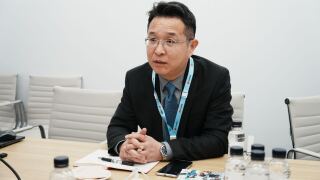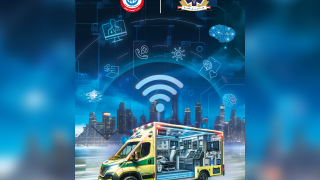For a long time, it seemed Hong Kong had escaped most of the ravages of Covid-19. For most of 2020 and 2021, this special administrative region of China seemed to have avoided the pandemic through strict health controls, along with testing and quarantine at its airport. There was a time in early 2021 when the seven-day average of new cases was at around 70 cases – trivial compared with the rest of the world.
But in February 2022, just as most of the rest of the developed world was starting to ease Covid-19 restrictions, infections in Hong Kong accelerated, peaking at seven-day average of 66,194. And on 14 March, deaths peaked at 286. Since then, the pandemic has been tough on the people of Hong Kong.
“All of us around the world are being impacted by an asymmetric approach to the pandemic,” PCCW Global CEO Marc Halbfinger tells me. “In Hong Kong, the Omicron variant has found its way into the population. Other than in Hong Kong, we’re travelling and doing our best to be back in business.”
For PCCW Global and its new brand, Console Connect, are truly international. Both are part of Hong Kong Telecom, along with the mobile brand CSL. And over the past five years Halbfinger has steered a path simultaneously promoting both PCCW Global and Console Connect, a business PCCW acquired in 2017.
Halbfinger has one of the oddest job titles I have ever seen on LinkedIn. While he is not an evangelist for a start-up app company or a marketing rock star (both job titles that do exist), right under his name, his LinkedIn profile declares him as “Accelerating at Console Connect”. That’s “Accelerating”, with a capital A.
While Covid-19 infections in Hong Kong are heading back down once again (the seven-day average was at 2,433 on 11 April), what is accelerating are energy rates, supply chain issues and the war in Ukraine.
“We’re trying to deal with it all as best we can,” says Halbfinger. “When you take all of these into account and juxtapose them with technology developments, then technology continues to impact us all.”
Forcing change
“The world is increasingly cloudifying, and we’re assessing the impact of cloudification and AI,” he says. “This is all forcing change in product delivery and go-to-market strategy. There’s an interesting junction between supply and demand as technical capacity is moving at a faster pace.”
We turn back to Covid-19. Despite its recent upsurge in numbers, Halbfinger says “it’s not impacted us [in PCCW Global]. In January 2020 we were well prepared”.
Memories of 2003
That is something I have heard from other companies in Hong Kong. When rumours and reports about a coronavirus, and the disease itself, began spreading out from Wuhan in December 2019, people in Hong Kong remembered the outbreak of severe acute respiratory syndrome (SARS) that began in mainland China in 2003.
Seventeen years later, they knew what was coming, so they started preparing. While the rest of the world was saying Covid-19 was just another flu, people in Hong Kong people started working from home. Today, the situation is similar.
“Now we’ve had people working from home again,” Halbfinger tells me. “While in other parts of the world, people are moving back into offices – in the US, the UK and Singapore, for example.”
Halbfinger was one of the rare businesspeople who kept travelling during much of the pandemic. He reels off a list of places he visited, seemingly impervious to Covid-19: “I’ve been to Canada, Portugal, Greece, the UK and the UAE,” he says. But his luck did not hold out. “And then in January, I was in the US and got it.”
One of the sensitive issues that has faced PCCW Global and its management is the long telecoms dispute between the US government and the industry in China. It has hurt China Telecom and China Mobile, whose licences to operate in the United States were cancelled by the US Federal Communications Commission. Vendors such as Huawei and ZTE were also hit badly over other issues, mainly concerning sales to Iran; although Sweden’s Ericsson has also admitted to illegal practices in Iraq and elsewhere.
Business as usual
As a company based in Hong Kong, PCCW Global has kept an air of being above all that and it is not something Halbfinger is willing to talk about. “Our business continues to function as it is,” he says. “We have a large number of colleagues in Hong Kong, but not the majority. We have not seen any need to make changes.”
PCCW Global has operational centres in the US, Europe, Africa and the Philippines as well as Hong Kong, he says: “We have assets in many places. We see ourselves as a truly global company.” But he adds that “we do not have companies in Russia or Ukraine”, he smiles.
For a long time, Halbfinger chaired the Global Leaders’ Forum (GLF), the group of industry heads that is closely connected with International Telecoms Week (ITW), both of which are organised by Capacity Media.
While he has been succeeded by Laurinda Pang of Lumen, who is stepping down in May during this year’s ITW event, he is still involved in GLF operations, including the Communications Business Automation Network, an organisation set up by leading global ICT service providers to accelerate and oversee the adoption of automated settlement technologies.
CBAN was launched in early 2020, as Covid-19 rolled across the world, but that has not stopped it introducing new services, such as an identity service that verifies partners for any use case to automate settlements between ICT service providers.
It is yet another case where members of the wholesale industry recognise the need to work closely together for the benefit of all, on projects such as using distributed ledger technology for automated settlements. “I’m very grateful to Colt for continuing its primary role in driving the work forward,” says Halbfinger.
“Now we’re moving into an area that will facilitate settlement for network, cloud, applications or other services,” he says, adding that there is a need for a framework “that allows industrial flexibility”.
“Our teams [in PCCW Global] are active members of the technical committee of CBAN or on the board of directors,” he says.
There are other cross-industry working groups in which PCCW Global takes part, he says, listing MEF (formerly the Metro Ethernet Forum), the mobile industry’s GSMA, and the European Telecommunications Standards Institute, which, despite its name, is much more than European.
“We believe that when we look at those entities, we are heading in positive directions that will facilitate transformation and automation. We will find a roadmap for service providers and end users. It’s possible to establish a collaborative framework,” says Halbfinger.
Positive directions
And what about Console Connect? Halbfinger says: “It’s now enabled in more than 700 data centres and more than 140 cloud zones. Every week we see increases in users, in volume of traffic, leveraged by the automated platform. The fabric of automation is the lead driver of our direction.”
That is why the company is emphasising the Console Connect brand so much, he says. Some people have suggested that the PCCW Global brand is less prominent than it was, I say delicately. He shows me pictures of the company’s booths at events such as PTC and points out the dual branding.
“We are technology led,” he says, which is why both brands exist. “We’re not driving down the amazing global network that has been established by PCCW Global.”










